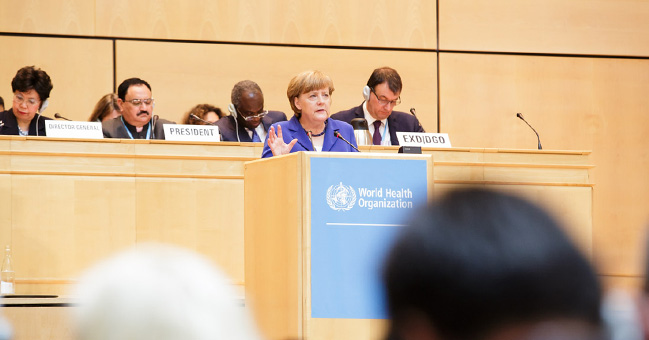World Health Assembly
Joining forces to tackle epidemics
"Health is a human right," stressed Chancellor Angela Merkel at the World Health Assembly in Geneva. This makes it all the more urgent to draw up a global disaster response plan to tackle epidemics. Health is also one of the priorities of Germany's G7 Presidency.
 Angela Merkel speaks at the World Health Assembly
Source: Bundesregierung/Steins
Angela Merkel speaks at the World Health Assembly
Source: Bundesregierung/Steins
The health of one person is also the health of others, said Angela Merkel in her address in Geneva on Monday (18 May 2015). "The human right to health can only be enforced if a sustainable health system is in place or is put in place in every country on Earth," declared the Chancellor. In our world, the effectiveness of the health system in one country impacts on the health of other countries, and on security and stability. The responsibility of individual countries and global shared responsibility are two sides of one and the same coin.
G7 working to strengthen health policy
Within the framework of its G7 Presidency, Germany has put three health issues on the agenda: firstly, the lessons learned from the Ebola epidemic, secondly poverty-related tropical diseases, and thirdly the increasing resistance to antibiotics. These three issues have one thing in common – they can only be successfully addressed if all countries are enabled to implement the International Health Regulations, said the Chancellor.
Learning from Ebola
Angela Merkel called for international cooperation and joint action. "The disastrous outbreak of Ebola in West Africa once again made us painfully aware of the urgent need for international action when crises strike. 26,000 people became infected with the virus, and more than 11,000 lives have been lost." The fight against Ebola is by no means over, she added. "The war will only be won when there are no new infections. In fact, the war will only really be won when we are properly equipped to face the next crisis, in other words, when we have learned from this crisis."
Global disaster response plan needed
"We need a sort of global disaster response plan," declared Angela Merkel. The World Health Organization must play a key part in this. It is "the only international organisation that enjoys universal political legitimacy on global health matters". The aim must now be to make its structures more efficient.
In spite of all the international cooperation, the Chancellor said, we must not lose sight of one thing. The starting point must be that every county should ideally be able or be enabled to put in place its own health system, designed to ensure maximum resilience. Building robust health systems is a key task. "Germany accepts this task. This year and next year we will be providing affected countries with a total of 200 million euros. Of this sum, 70 million euros is earmarked for West Africa to help West African states build sustainable structures. It should be seen as help towards self-help," underscored Angela Merkel.
Combating tropical diseases
The second item on the G7 agenda is neglected and poverty-related tropical diseases. Many countries are too poor to build their own health system. About 1.4 billion people are affected by what are known as "neglected" tropical diseases, pointed out Angela Merkel. Often these diseases can be tackled at a relatively low cost. "What we need is firstly to establish robust health systems in the long term, secondly of course the outputs of the pharmaceutical industry, and thirdly the logistics to distribute these products," explained Angela Merkel. It is important to cooperate closely with affected countries.
Ensuring that existing antibiotics remain effective
Resistance to antibiotics, the third item on the agenda, is crucially important for the entire human race. We must ensure that existing antibiotics remain effective, and that they are used only for medically necessary purposes. The G7 summit in Schloss Elmau is to agree on extremely strict regulations governing the use of antibiotics.
"I am delighted that the World Health Assembly has undertaken to draw up the first global action plan to address the problem of antimicrobial resistance. Every country should have a plan of this sort. Only a few days ago the German Cabinet adopted its own antimicrobial resistance strategy," reported Angela Merkel.
The World Health Assembly is the supreme decision-making body of the World Health Organization (WHO). It adopts resolutions on the actions of the WHO, appoints the Director-General and approves the proposed budget. More than 3,000 delegates from the 194 member states of the WHO are attending the Assembly in Geneva, along with many non-governmental stakeholders. This is the 68th session of the World Health Assembly.

